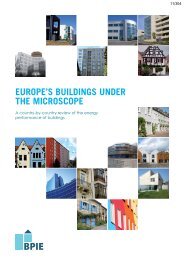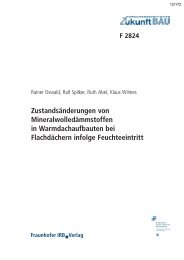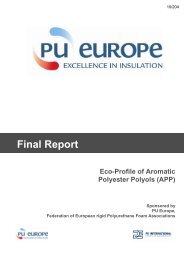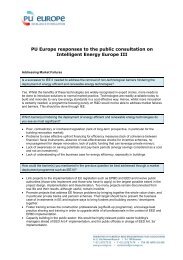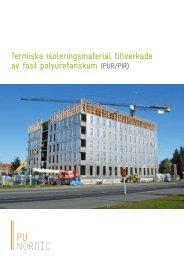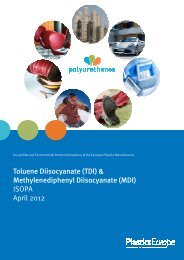Multiple benefits of renovation in buildings - PU Europe
Multiple benefits of renovation in buildings - PU Europe
Multiple benefits of renovation in buildings - PU Europe
You also want an ePaper? Increase the reach of your titles
YUMPU automatically turns print PDFs into web optimized ePapers that Google loves.
<strong>Multiple</strong> <strong>benefits</strong> <strong>of</strong> <strong>in</strong>vest<strong>in</strong>g <strong>in</strong> energy<br />
efficient <strong>renovation</strong> <strong>of</strong> build<strong>in</strong>gs<br />
reduced outlay on subsidies for energy consumption by €0.7 billion <strong>in</strong> the low EE scenario<br />
and €1.1 billion <strong>in</strong> the high EE scenario, cf. Table A.13.<br />
Table A.13 Reduced outlay on energy consumption subsidies<br />
billion € Low EE scen High EE scen<br />
Saved energy consumption<br />
subsidies (2012-2020) 0.7 1,1<br />
Saved energy consumption<br />
subsidies (2020-2030) 0.7 1.1<br />
Source: Copenhagen Economics, based on OECD (2011c).<br />
In some countries, production <strong>of</strong> energy based on fossil fuels is also subsidised. These<br />
subsidies are however <strong>of</strong> relatively small, and decreas<strong>in</strong>g magnitude. In Germany e.g.<br />
where subsidies to coal production historically has been sizeable, it is be<strong>in</strong>g gradually<br />
phased out and currently stands at €1.7 billion <strong>in</strong> 2010 down from about €5 billion <strong>in</strong><br />
1999. 60 This subsidy <strong>in</strong>cludes support for clos<strong>in</strong>g down coal fired power plants. Subsidies<br />
<strong>of</strong> this k<strong>in</strong>d will not be affected by a lower energy consumption spurred e.g. by <strong>in</strong>creased<br />
energy efficient <strong>renovation</strong> <strong>of</strong> build<strong>in</strong>gs, and is therefore not <strong>in</strong>cluded <strong>in</strong> our assessment.<br />
A.8 Reduced outlay on subsidies - renewable energy<br />
deployment<br />
The EU Member States have agreed to the ambitious “climate and energy package”, <strong>in</strong>clud<strong>in</strong>g<br />
the three 20-20-20 targets: 61<br />
<br />
<br />
<br />
A reduction <strong>in</strong> EU greenhouse gas emissions <strong>of</strong> at least 20% below 1990 levels<br />
20% <strong>of</strong> EU energy consumption to come from renewable resources<br />
A 20% reduction <strong>in</strong> primary energy use compared with projected levels, to be<br />
achieved by improv<strong>in</strong>g energy efficiency.<br />
Invest<strong>in</strong>g <strong>in</strong> energy efficient <strong>renovation</strong> <strong>of</strong> build<strong>in</strong>gs clearly contributes to the third target,<br />
but it also contributes to the first and second target by lower<strong>in</strong>g EU energy consumption<br />
and thus greenhouse gas emissions.<br />
All EU Member States have put forward detailed plans on how to achieve the second objective:<br />
<strong>in</strong>creas<strong>in</strong>g the share <strong>of</strong> renewable energy <strong>in</strong> energy consumption to 20 per cent on<br />
average. These plans <strong>in</strong>volve expand<strong>in</strong>g different types <strong>of</strong> renewable energy <strong>in</strong> both electricity<br />
and heat generation. By reduc<strong>in</strong>g the total energy consumption through energy<br />
efficiency <strong>renovation</strong>s, the RE-target will be cheaper to meet by def<strong>in</strong>ition.<br />
60 See OECD (2011), Inventory <strong>of</strong> budgetary support and tax expenditure for fossil fuels – Germany, page 3.<br />
61 DG Climate webpage. http://ec.europa.eu/clima/policies/package/<strong>in</strong>dex_en.htm<br />
58



